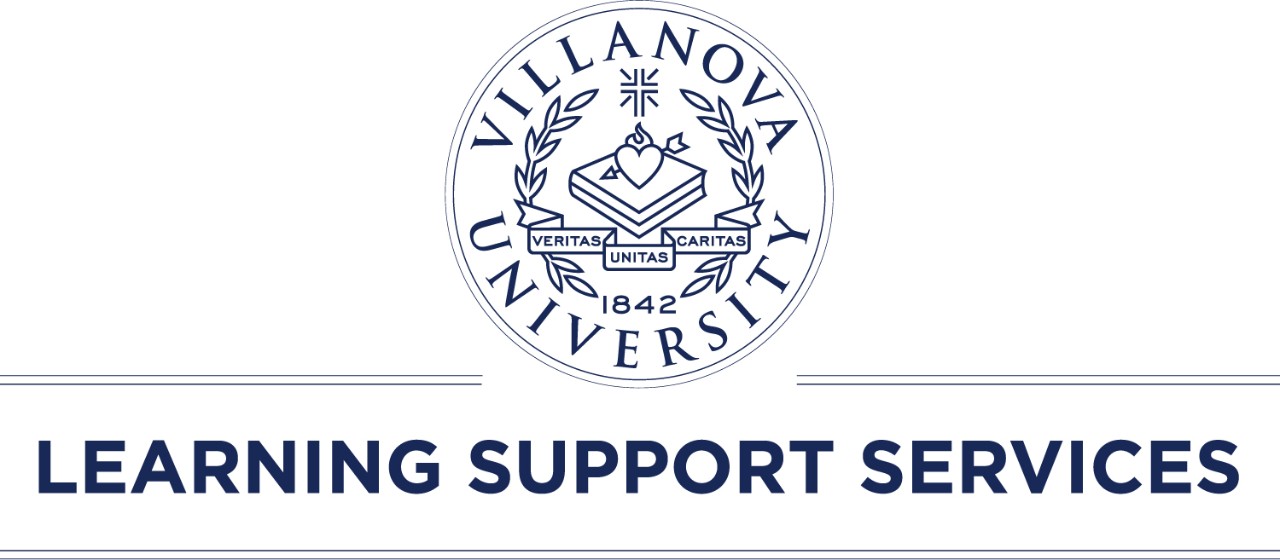Student Resources for Taking Online Classes
LSS has developed resources for students to help them be successful while taking online classes. Students should also check out the resources that UNIT has put together about Learning Remotely.
Follow LSS on Instagram, Twitter, and Facebook @VillanovaLSS for additional study tips and techniques on how to manage your time and stay organized while working from home and strategies for managing stress.
Strategies for Taking Online Classes
Tips for Staying Motivated and Managing Your Time
Meditation
Check out these meditation apps, Calm, Headspace, and Insight Timer, to better manage your stress, anxiety, depression, or difficulty sleeping.
Exercise
It's important to find ways to move and exercise. Many gyms, yoga, and dance studios are offering online classes that you can stream online. Try taking walks and getting fresh air when you can.
Mental Health Support
The Counseling Center
This is a challenging time and we know many may be struggling with their mental health. The Counseling Center is open and available to help you with personal and emotional concerns. All services are free of charge to current students.
To get started:
- Appointments may be scheduled by phoning the Counseling Center.
- Call 610-519-4050 weekdays between 9 a.m. and 5 p.m.
- You will be offered an appointment time that works with your class schedule.
- Appointments are usually available within a week of your request.
- The Counseling Center has partnered with Uwill to offer 24/7 telehealth counseling.
Other Mental Health Support Resources
If you find that you are struggling and need someone to talk to, you should also consider reaching out to a Warmline. "Unlike a hotline for those in immediate crisis, warmlines provide early intervention with emotional support that can prevent a crisis - and a more costly 911 call or ER visit. The lines are typically free, confidential peer-support services staffed by volunteers or paid employees who have experienced mental health conditions themselves." If you live in Philadelphia or the Greater Philadelphia area you can call these Warmline numbers. To find a Warmline near you, you can search for Warmlines in your city or county.
You should also check out these resources from the JED Foundation on how to manage your mental health during COVID-19.
Before taking an online test or exam, it’s important to be prepared for any issues that may arise during the test. Below are tips to help you get ready.
- Choose a space that is distraction-free and turn off your phone and other devices.
- Have the following materials ready:
- Your computer and power cable
- Access to reliable internet
- Textbook and notes (if allowed)
- Writing utensils and scratch paper
- Follow the rules of academic integrity.
- Write in your own words, do not plagiarize.
- Do not contact classmates or share your answers.
- Do not copy or distribute the exam when you’re finished.
- Stay on the exam’s website. Use another browser window if you need to look up information (if allowed).
- Check your work.
- Save back up information in case you have technical difficulties. For example, write your answers in a document that you can cut and paste onto the online exam.
- Be sure to click “Submit.” Take a screen shot as a record of completing the exam.
- Report any technical issues to your professor as soon as possible.
Open note tests take a lot of preparation. While they are often designed so that the answers are from the material used in class, unless you know WHERE that material can be found, you may not have enough time to look for it. Here are some tips on how to best prepare for these types of exams.
- Create study and reference notes using charts, graphic organizers, reference guides to organize main topics, themes, and information.
- Use color coded tabs in your textbooks or notebooks with separate colors for themes. Put key words on the tabs.
- Brainstorm possible subjects and come up with examples.
- For essays: develop an idea and plan an outline by finding the required information and references.
- Create an “aid” sheet to help you find and apply your information quickly.
- Have extra paper on hand to write down ideas.
For additional resources, check out our Strategies and Resources for Academic Success.

